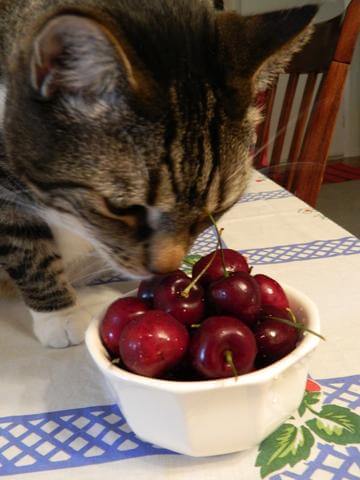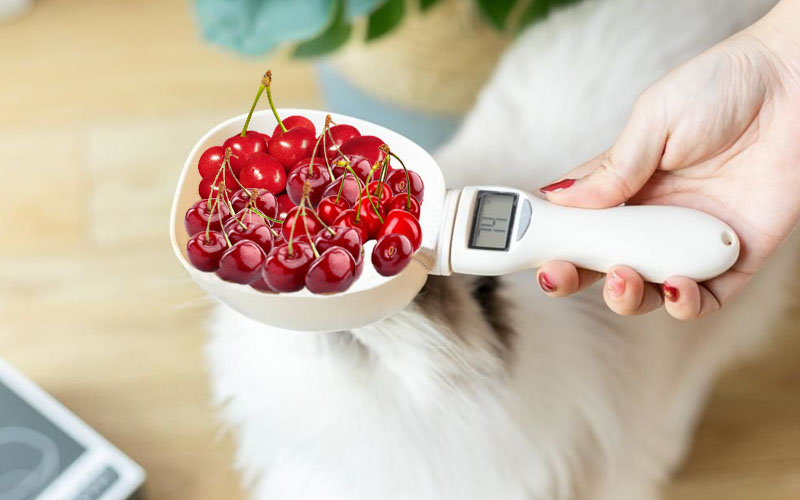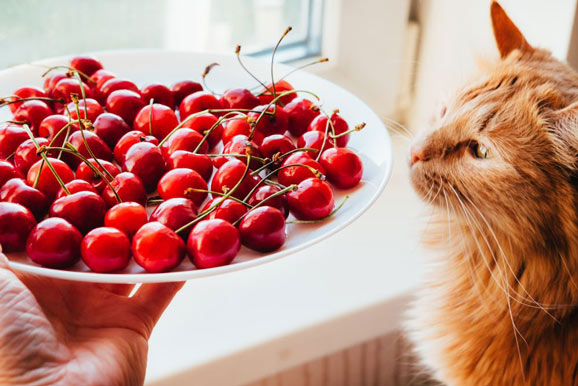If you’re a cat owner, you know that cats love to eat and they’re happy eating most of the foods. However, some of the foods you love to eat aren’t always healthy to give to your cat. Some fruits and veggies are fine with cats, but others are detrimental to your health. Are cherries some of the fruits you should avoid? Can cats eat cherries?
In case you were wondering cats can eat cherries, why not, but only if you remove the pits first. Cats are carnivorous so they derive most of their nutritional benefits from animal sources and protein. Although the cherry flesh will not help in meeting your cat’s daily nutritional requirement, it has anti-inflammatory and antioxidant properties that can help in improving the health of your cat in the long run. For the sake of your cat’s digestion, give in small quantities. Cherries are fleshy treats that are juicy, chewy, and sweet with a bright red color that looks like candy. Your cat is most likely going to taste a cherry from curiosity.
Cats and cherries: How much is too much

Cherries are safe for your cat to consume, but be careful not to overfeed your cat with the high fiber fruit. Too much fiber can cause digestion problems like diarrhea and vomiting. The digestive system of a cat naturally isn’t able to break down a lot of sugar. Cherries tend to contain a lot of natural sugars that’s why it’s not advisable to give your feline friend too many cherries. A few deseeded cherries are enough for your cat if you give more your cat may start to diarrhea. You should be aware that cats don’t usually like fruits and cherries don’t provide them with enough essential daily nutrients that your cat needs.
Cats are mainly carnivorous animals but you can give your cat a few cherries every once in a while as a treat. Pet vets warn about introducing new foods as it’s risky because you don’t know whether your cat will react to it or not. Vets recommend that you feed your cat pet food because it contains all the nutrients your cat needs to live a healthy life.
Nutritional benefits
Cherries contain antioxidants that your cats need as much as you do. It helps to reduce inflammation, fight against carcinogens, and reduce the risk of heart disease. So a few cherries for your cat will help to increase her antioxidant intake. Cats get more curious as they get older so they’re more likely to eat dirt from the lawn or even play around on wet surfaces. The antioxidants will help in reducing skin infections so your cat can jump and play more freely without having to worry about risks of injury or other health problems.
Cherries also contain melatonin which is a very important substance which is also called the calming drug. Sometimes your cat can get stressed or worked up from the presence of guests in the hose or loud sounds like firecrackers. This substance helps to reduce this tension or anxiety on a cognitive and psychological level. Melatonin calms the brain and nervous system reducing the discomfort and stress your cat feels. Your feline friend is less irritated, anxious, or fearful during such situations.

Cherries also have anti-inflammatory properties that help to reduce the risk of injuries in an athlete during workout sessions. By reducing the amount of inflammation in your cat’s body, cherries lower the risk of your cat getting chronic illnesses like heart disease, diabetes, or even cancer. If your cat suffers from arthritis, you will notice she doesn’t move a lot because of the pain in her joints, eating cherries can help reduce this pain, especially if your cat is older.
Although the vitamins and minerals in the cherries aren’t very beneficial to your cat, the fiber in the fruit may be of help. Fiber is found in all fruits and veggies and is the part of the food that isn’t broken down during digestion and it helps your cat to have better absorption. If there is a slight change in your cat’s regular diet, it will help to improve your cat’s bowel movements so that she won’t have trouble with her digestion.
Possible risks

Cats are obligate carnivores thus they will have problems digesting fruits like cherries which means it will take longer to break down the nutrients and this can lead to indigestion, upset stomach, or diarrhea.
Cherries contain maraschino, a natural sweetener and your cat can’t easily digest sugar, so when your feline friend eats too many cherries it can cause sugar ingestion and the result is an overweight cat.
Cherries have pits that can be a choking hazard for your cat so you should always deseed the cherries before feeding them to your cat. The pits, leaves, and stems are also considered to be poisonous as they contain cyanide. Cyanide is a substance that prevents the transportation of oxygen in and around the body and thus prevents the enzymes in the body from working properly. It releases toxins in your cat’s body which can lead to dilated pupils, difficulty in breathing, discolored gums, and this can often kill your cat if you don’t deseed the cherries or you don’t seek medical attention immediately.
Feeding your cat too many cherries can give your cat an upset stomach or diarrhea so don’t go overboard in feeding. Just a few cherries once in a while will do.
So, can cats eat cherries?
You can give small amounts of the cherry flesh to your cat without the seeds. Cherries contain plenty of vitamins, minerals, and antioxidants that have nutritional benefits for your cat. By giving your cat a handful of cherries, you give her a boost of antioxidants and anti-inflammatory substances that will help to fight inflammation, diseases, and help improve the quality of your cat’s life. To be on the safe side, it’s advisable to first pay a visit to the vet to get more information on the foods that can be fatal for your cat. This will give you a better understanding of how cherries will affect your cat’s health.
